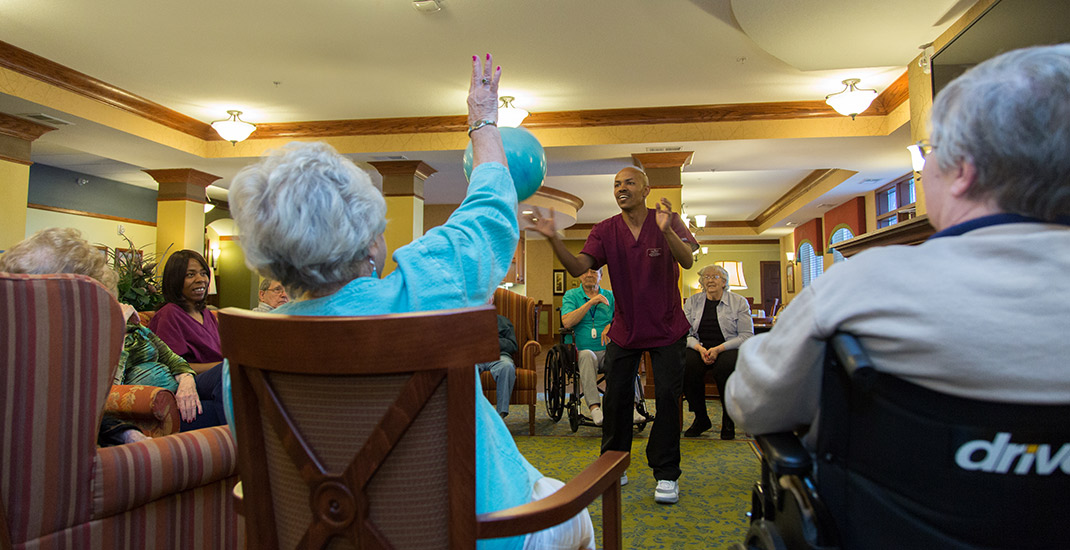Charlotte Memory Care: Specialized Care for Alzheimer's and Mental deterioration
Developing a Safe and Helpful Environment: In-Home Memory Treatment Fundamentals
Establishing a nurturing and secure setting for individuals requiring at home memory care is extremely important to their wellness and quality of life. From ensuring safety and security within the living area to using efficient communication strategies and executing memory-friendly layout aspects, there are essential parts that add to an all natural care strategy. By concentrating on developing a supportive ecological community that accommodates the one-of-a-kind requirements of those with memory problems, caretakers can significantly improve the daily experiences of their liked ones.

Safe Living Atmosphere
Producing a safe and secure and hazard-free living environment is vital when supplying at home memory treatment for people with cognitive problems. Ensuring the safety of the individual with memory loss is critical to prevent accidents and promote a sense of well-being.
Furthermore, it is essential to set up security functions such as grab bars in restrooms and handrails along staircases to provide support and prevent crashes. In addition, making use of modern technology such as activity sensing units and alarms can notify caregivers if the individual wanders or remains in distress. Producing a secure living setting likewise includes executing techniques to stop wandering, such as making use of door alarm systems or locks to limit access to unsafe locations. By prioritizing safety measures and getting rid of prospective risks, caretakers can give a safe and supportive atmosphere for individuals with cognitive problems getting at home memory treatment.
Effective Interaction Strategies
Executing tailored communication approaches is important in fostering significant communications with individuals with cognitive problems in the context of in-home memory care. Reliable communication plays a critical role in producing an encouraging environment that improves the health and quality of life for people with memory concerns. When communicating with somebody experiencing cognitive decrease, it is necessary to utilize straightforward and clear language, preserve a calmness and favorable tone, and provide visual hints to assist understanding.
One key method is to exercise energetic listening, revealing empathy, patience, and respect throughout discussions. Non-verbal signs such as faces and body language can likewise assist communicate understanding and assistance. In addition, making use of reminiscence therapy by talking about past experiences or using songs and art can use lasting memories, triggering links and stimulating engagement.
Moreover, incorporating regular routines and consistent communication patterns can provide a sense of familiarity and safety and security for individuals with memory impairments. By applying these interaction techniques, caretakers can develop significant links and advertise a sense of comfort and count on the in-home memory treatment setup.
Memory-Friendly Style
Provided the importance of creating an encouraging setting for people with memory issues through reliable interaction approaches, the unification of memory-friendly style elements in the home comes to be vital in optimizing their daily experiences and total wellness. Memory-friendly layout concentrates on enhancing safety and security, convenience, and independence for individuals with cognitive impairments. Straightforward adjustments can make a significant distinction, such as utilizing contrasting shades to enhance visibility and lower confusion, including clear signage to assist navigation, and minimizing clutter to prevent sensory overload.
Integrating familiar aspects from the person's past, such as individual images or favorite items, can evoke positive memories and produce a sense of experience. By integrating these memory-friendly style aspects, caregivers can supply a encouraging and secure living room that makes it possible for people with memory concerns to keep their self-reliance and high quality of life. Charlotte Memory Care.
Daily Regimen Planning
When creating an everyday routine for people with memory issues, mindful planning is essential to sustain their cognitive function and total wellness. Developing a structured timetable can assist reduce confusion, anxiousness, and disorientation usually experienced by those with memory disabilities.
Flexibility is key, as some days may need Charlotte Memory Care modifications based on the individual's state of mind and power degrees. Consistently reviewing and adjusting the day-to-day timetable will help ensure its effectiveness in promoting a comforting and favorable setting for people with memory obstacles.
Assistance System Execution
Developing a durable network of helpful individuals plays a critical role in enhancing the quality of treatment and health for people requiring memory assistance. Relative, pals, see it here health care professionals, and community resources can all add to developing a solid support system. Communication amongst these people is necessary to make sure that the requirements of the individual with memory challenges are fulfilled successfully.
Household members are often the key caregivers and create the backbone of the support group. They supply daily treatment, emotional assistance, and companionship. It is critical for member of the family to seek aid and break when required to stop burnout and make sure the very best possible take care of their enjoyed one.
In enhancement to household assistance, involving medical care professionals such as physicians, registered nurses, and therapists can supply customized care and assistance. These experts can supply valuable insights, medical recommendations, and aid in managing the individual's condition.

Conclusion
To conclude, creating a secure and helpful environment for people with memory care demands is vital for their health. By developing a secure living setting, using effective communication strategies, including memory-friendly style components, intending day-to-day regimens, and applying a strong support group, caretakers can aid improve the top quality of life for those with amnesia. These vital components function together to develop a nurturing and empowering atmosphere that advertises freedom this and enhances overall high quality of life.
Producing a secure and hazard-free living atmosphere is extremely important when offering in-home memory care for individuals with cognitive problems. By focusing on safety and security measures and getting rid of potential dangers, caregivers can offer a helpful and safe atmosphere for individuals with cognitive disabilities receiving at home memory care.
Developing a robust network of helpful individuals plays a critical duty in enhancing the high quality of care and wellness for people requiring memory assistance - Charlotte Memory Care. Interaction among these individuals is essential to guarantee that the requirements of the specific with memory difficulties are met efficiently
